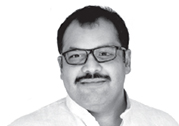
DR. MANDAR PATTEKAR
As our next presidential election looms closer, the sheer barbarism of the public arena vocalization filled me with great anguish. On the current political debate stages, behavior like blatant lying, interrupting the opponents, childish insults have become a norm for the people vying to hold offices of public trust. In stark contrast is the ancient Hindu technique of debate called Purva (prior) paksha (side)and Uttar (later) paksha (side).
The aim of any honest debate is to conclude what is the absolute truth. Each debater brings his or her relative truth to the table. Based on their past experiences, either intellectual or physical, each debater tries to prove that their relative truth is as close as possible to an absolute truth. For this to occur, each debater must debate based on his perspective, and not based on personal ego or an undisclosed agenda. Further, each should be willing to embrace the resultant conclusion of the debate. Prior to the debate, the opponents make a wager on the result. The usual wager in ancient India was that the defeated debater and his followers become the disciples of the winner.
Purva paksha phase of the debate starts when each of the opposing debaters states in greatest possible detail the perspective of their opponent. For this to occur, each debater must have the deepest understanding of the stated position of their opponent. The rivals then agree that the opponent has indeed expressed his position correctly. Then comes the next phase of Uttara paksha. The first part of Uttara paksha is where each debater gives a rebuttal to the opponent’s position. In the second part, each debater states their position. Finally, as one of the debaters fails to provide rebuttals, the judge declares the winner, and the defeated party accepts the perspective of the winner.
A classic example of this kind of debate occurred in the 7th century (around middle of 600 CE) between two great rival philosophers and scholars, Shankara and Mandana Mishra. Since Shankara was a young monk in his 20s, Mandana who was much older, and a well-established scholar, gave him the opportunity to choose the judge. Shankara charya chose Mandana’s wife Ubhaya Bharati who was a great scholar in her own accord. The wager was that the losing scholar would become a renunciate (monk) and accept the winner’s school of philosophy. After an intense and long debate, Mandana was defeated. Just as he was going to take the vow of renunciation, his wife who did not want to lose her husband, challenged Shankara, saying that a husband and wife are two halves of one soul. Therefore, Shankara must debate with her, too, prior to proclaiming his victory.
Ubhaya being a clever woman, debated Shankara with questions involving marital issues. Shankara being a celibate had no marital knowledge. Being a fair contestant, she gave him a week’s time to get the knowledge. Incidentally, a king of a neighboring kingdom died at that time. Shankara, using his yogic powers, transmigrates his soul into the dead king’s body, and the body became alive. By living as the king with his many wives and discussing in depth the intricacies of marriage with one of the wise queens, Shankara gains the requisite knowledge, and by the end of the week, departs the king’s body and returns to his own.
The next day he soundly defeats Ubhaya based on his newfound knowledge augmenting his profound knowledge and wisdom. Both the husband and wife then become Shankara’s disciples, and after his death at the age of 32 years, carry on his school of philosophy.
Imagine our presidential candidates debating using the Purva paksha and Uttara paksha technique. Even if the defeated does not accept the perspective of the opponent, the fact that he/she learns about the opponent’s position and the basis for holding that position will make politics very civilized, and through it, the government will truly be OF the civilized people, FOR all the people, and BY the reasonable people.
Dr. Pattekar is a radiologist. He serves as National Director of Service Activities for Hindu Swayamsevak Sangh, USA. He also serves on the Board of Volunteers of Hindu Temple of Central IL, Peoria.

Recent Comments